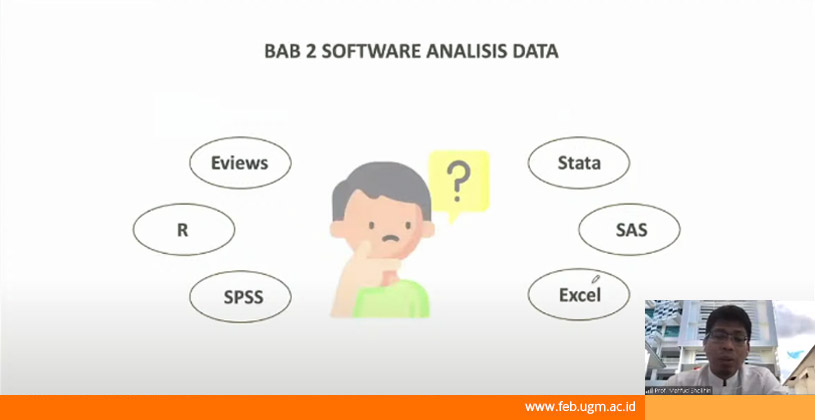Accounting Lab Holds Research Data Analysis Webinar using STATA Software
- Details
- Written by Kirana
- Category: News
- Hits: 934

On Friday (26/02) at 09.00 a.m, the webinar event of a book launching titled "Analisis Data Penelitian Menggunakan Software STATA" and the Dissemination of DIKTI Grant Opportunities and PMDSU (Pendidikan Magister Menuju Doktor Untuk Sarjana Unggul) Scholarships was successfully conducted by the Laboratory of Accounting, Department of Accounting, Faculty of Economics and Business Universitas Gadjah Mada (FEB UGM) in collaboration with ANDI Publisher. This webinar was attended by various groups of participants from several universities through Zoom Webinar and Live Youtube Fakultas Ekonomika dan Bisnis UGM.
In this webinar, the entire event was guided well by a moderator, namely Laksmi Candra N., S.E. To start the event, Dr. Eko Suwardi, M. Sc., as the Dean of FEB UGM, gave a warm welcome beforehand. In his remarks, he was proud of such activities as this launching of the book “Analisis Data Penelitian Menggunakan Software STATA” which was written by Prof. Mahfud Sholihin, M.Acc., Ph.D. and Puspita Ghaniy Anggraini, S.E. because it is a dissemination of knowledge and also scientific works.
Next, the event continued to present the first speaker, Prof. Dra. Indah Susilowati, M.Sc., a Professor of the Faculty of Economics and Business, Universitas Diponegoro, delivered the keynote speech at this session. Discussing the research, according to Prof. Indah, research must have novelty, opportunities to be explored, and logical so it can add to theoretical development as well as for empirical practices. In addition, Prof. Indah also explained the PMDSU Grant, which is research to develop the quality of the PMDSU education program to grow postgraduate capacity as research centers, innovators, and contributing to theoretical and empirical studies.
The event continued to the next session, a presentation of material from the two authors of the book “Analisis Data Penelitian Menggunakan Software STATA”, which discussed the contents and parts of the book. Prof. Mahfud Sholihin, M.Acc., Ph.D. as the author of the book and also a Professor of FEB UGM started the discussion. He stated that the background of this book was originally a part of the PMDSU Grant contract. However, not only that but the background of this book is also taken from his observations of students. Prof. Mahfud often saw many students had difficulty analyzing and processing data. “You are being the best if you can be useful to others.”, explained Prof. Mahfud regarding the motivation behind writing the book.
As a co-author of the book, Puspita Ghaniy Anggraini, S.E., continued the session by further discussing the contents of the book. According to Puspita, the book they wrote is intended for beginners who are new to STATA software, especially undergraduate and postgraduate students. The book contains topics about how to operate STATA which is written as easy-reading as possible with illustrative examples of data. Broadly speaking, the contents of the book is divided into six parts.
The first part of this book begins with an understanding of research data analysis followed by selecting and identifying the appropriate analysis software to use in the second part. Furthermore, the third part discusses the introduction of research data and in the fourth part discusses preparing the data to be analyzed. The discussion on describing data patterns is available in the fifth part which then ended with inferential statistical analysis and hypothesis testing in the sixth part.
The next session was a discussion on the review of the book “Analisis Data Penelitian Menggunakan Software STATA” which was guided by Eny Sulistyaningrum, Ph.D., a lecturer at the Department of Economics, FEB UGM. During this session, she reviewed the entire book and provided some constructive feedback. According to her, the book is written in a language that is easy to comprehend and suitable for beginners. Moreover, the author has tried to provide a basic understanding of the concepts of analysis along with examples so that they are easier to be pictured.
At the end of the session, several suggestions were conveyed, some of them are the need to include a summary at the end of each discussion in the points format and for the discussion in the inferential analysis, section to be deepened into an independent chapter for each type of estimation or test. However, overall, she highly appreciates the publication of this book that discusses the use of STATA software. The webinar ended with a Q&A session and the giveaway of three copies of the book for the best questions asked from the participants.
Reportage: Kirana Lalita Pristy/Sony Budiarso


